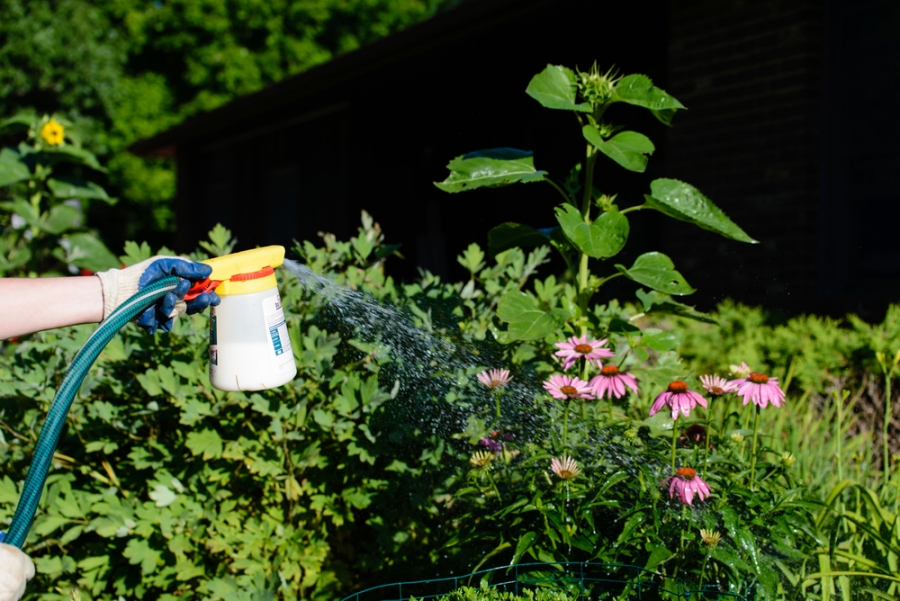Modern living requires people to reside in close proximity to one another. Living in populous areas means that one person’s actions when it comes to his or her home might affect dozens — or even hundreds — of other people.
Fumigating or spraying pesticides certainly qualify as actions that would affect you and your home if your neighbor should decide to handle an infestation with toxic chemicals. Read on to learn how these treatments work, how they could negatively affect your health, and the best techniques to protect yourself, your property, and your family.
Fumigation Facts
Fumigation occurs when a homeowner decides to handle a structural infestation, such as termites, ants, or wood-boring insects, by releasing poisonous gas into their home, which is sealed off by a professional pest control company. A fumigation tent acts as a primary barrier to keep the inherently toxic insecticides contained within the house being fumigated. The tent is the first defense against any poisons leaking out of the house and harming people, pets, and plants.
The most common fumigant is sulfuryl fluoride, a biocide that kills all living organisms (hence the necessary evacuation of the house and subsequent tenting). Since sulfuryl fluoride is odorless and colorless, fumigators add a warning agent called chloropicrin (Vikane), which has a very strong odor and will cause eye and throat irritation. If you notice these symptoms, immediately evacuate all people and pets from the house, move to a safe, well-ventilated area, and contact the pest control company — you will usually see a sign with the company’s information near the tented home.
Every state has regulations in place to control the amount and flow of pesticides being used in a fumigation, but each state varies. Research to see the specific laws that govern these practices where you live.
Should You Worry About an Infestation?
You might be tempted to pick up the phone and call a pest control company the minute you see a fumigation tent or a uniformed worker spraying chemicals on the outside of your neighbor’s home. It’s natural to be worried that the fleeing pests will seek refuge in your home instead, and you understandably want to avoid that wretched possibility at all costs.
The reality is that reputable pest control companies kill off the large majority of pests in the area, and many common pesticide techniques include introducing toxic chemicals that are carried by the pests back to their nesting area, further eradicating them.
Nonetheless, an infestation in a neighbor’s home might be an indication that the same or similar pests are in your home. Be alert in noticing the warning signs of pests, such as mouse droppings or termite mud tubes, and call a certified pest control expert the moment you see such activity.
Pesticide Practices
Of course, pesticides aren’t limited to commercial fumigators; many homeowners use common store-bought pesticides to eliminate termites, ants, rodents, and other unwanted visitors.
Dangerous Drifts
A problem arises when those pesticides don’t remain contained in their intended area. Pesticide drift is the name for when pesticides (as well as herbicides and fungicides) settle on water, soil, yards, and homes beyond their intended target. Even the most professional sprayers — who use high-quality equipment, employ proper spraying techniques, and avoid windy days — cannot always fully avoid pesticide drift.
Furthermore, a second type of drift, known as volatilization drift, occurs when settled pesticide spray becomes vapor after a period of hours (or days). High temperatures and winds can increase the likelihood of volatilization drift. For the past decade, the Environmental Protection Agency (EPA) has studied the conditions surrounding volatilization drift and the effects that it causes in order to develop a better understanding for any health impacts, but many experts have long been concerned about the deleterious effects that pesticides have on the human body.
How to Protect Yourself
Regulations for spraying pesticides for residential or commercial purposes vary from state to state. An individual has little recourse to prevent pesticide drift other than reporting it to regulatory agencies, but some smart behaviors can help reduce exposure to harmful chemicals.
If you have advance warning of heavy spraying or notice it occurring, close the windows in your home and shut the vents of your HVAC system. Take any pets inside and if possible, also take inside any patio furniture, toys, and laundry to prevent pesticides from collecting on them. Those with weakened immune systems or chronic illnesses, as well as the elderly and infants, should be relocated elsewhere for a few hours until the spraying has ceased.
In the long term, bordering your home with trees and shrubs can provide a beautiful, natural, and effective barrier.
What About My Air Quality?
The United States Consumer Product Safety Commission (CPSC) has determined that 80 percent of all Americans’ exposure to pesticides occurs indoors, whether from household pesticides or contaminated soil or dust that is tracked in from outdoors. Moreover, 75 percent of U.S. households claimed to have used at least one pesticide inside the home over the past year. This airborne exposure, and poor indoor air quality in general, can be damaging to one’s health without proper precaution.
Health Concerns
Acute exposure can result in headaches, sore throats, nausea, and dizziness, whereas long-term exposure can damage the liver, kidneys, central nervous system, endocrine system, and reproductive system. Some studies have even linked long-term pesticide exposure to Parkinson’s disease, ADHD, and leukemia.
Tactics You Can Use
The CPSC recommends natural ventilation (opening of windows and doors, using window fans, opening vents) where possible. They stress that many air cleaners for sale, particularly tabletop versions, are not always highly effective at removing airborne particulate matter, and most air cleaners are not designed to eliminate gaseous pollutants from an environment.
Help Your Neighbors
The EPA has expressed concern about the widespread presence of pesticide residues in American homes and has outlined several steps to reduce exposure to these harmful chemicals.
You can only do so much about your neighbors’ activity, but you can certainly keep your indoor space clean, dry, and well-ventilated. If you do have a good relationship with your neighbors, you could suggest the use of alternatives, such as integrated pest management, biological pesticides or organic pesticides, or disease-resistant plants that would not need herbicidal control.
If you have further questions, the EPA and Oregon State University sponsor the National Pesticide Information Center (NPIC), a toll-free number and website dedicated to providing homeowners with information about pesticides.








